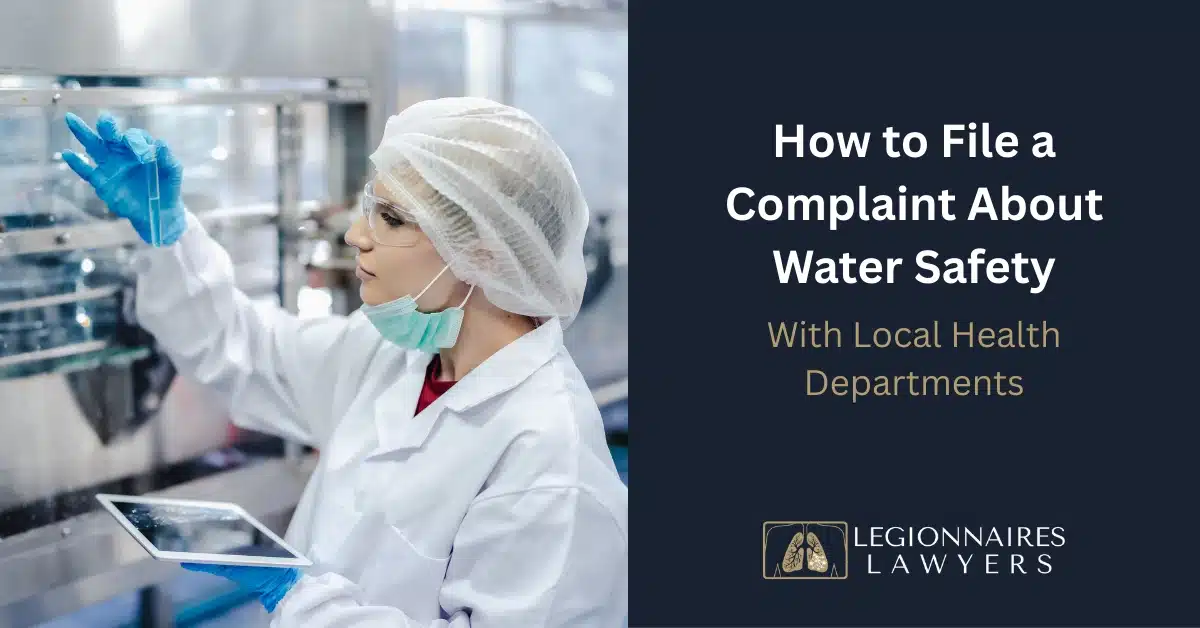
When it comes to public health, water safety plays a critical role. Contaminated water systems can harbor dangerous bacteria like Legionella, the cause of Legionnaires’ disease—a severe form of pneumonia that can be fatal if left untreated. If you suspect unsafe water conditions in your home, workplace, or a public facility, it’s essential to take action promptly. Filing a complaint with your local health department is the first step toward protecting yourself and others. Here’s a guide on how to do it effectively.
Why Water Safety Complaints Matter
Poorly maintained water systems can create environments where bacteria flourish, particularly in places with warm, stagnant water. This includes plumbing systems, cooling towers, fountains, hot tubs, and even decorative water features. Legionella bacteria thrive in these conditions and can be inhaled through aerosolized droplets, leading to serious respiratory illnesses.
While federal agencies like the CDC provide national oversight and recommendations, local health departments handle most inspections, investigations, and enforcement actions related to water safety.
Step-by-Step Guide to Filing a Water Safety Complaint
1. Identify the Source of Concern
Before filing a complaint, gather detailed observations. Are you experiencing discolored or foul-smelling tap water? Have you noticed mold, rust, or sludge buildup in communal water features? Are there reports of Legionnaires’ disease or other illnesses linked to the location?
The more specific you can be, the better. Document what you see, take photos or videos if possible, and note any symptoms or health concerns affecting yourself or others.
2. Locate Your Local Health Department
Every city or county has a designated health department. You can usually find their website by searching “your city/county + health department.” Their site will often include a section for “Environmental Health” or “Public Health Complaints.” Look for topics like “water quality,” “legionella,” or “sanitation.”
3. Submit the Complaint
Most health departments offer multiple complaint submission methods:
- Online forms – These are the most common and allow you to submit complaints 24/7.
- Phone calls – Ideal for urgent or complex cases. Be prepared to provide detailed information.
- Email or mail – Some departments accept written reports if you prefer to document the issue formally.
- The exact location of the water safety issue
- The type of problem observed (e.g., hot tub with algae, cooling tower leak)
- The date/time of your observation
- Any related health symptoms or hospital visits
Make sure to include:
If someone has been diagnosed with Legionnaires’ disease, notify the department immediately. Rapid reporting helps them trace potential outbreaks and take swift action.
4. Follow Up
After submitting your complaint, ask for a case number or contact person. This makes it easier to track the status of your report and receive updates. Health departments typically conduct inspections or sample testing, especially if there’s a potential public health threat.
5. Cooperate With Investigations
If your complaint leads to a health inspection or outbreak investigation, you may be asked for additional details, such as medical records or water samples from your property. Cooperating can help prevent others from getting sick and strengthen your case if legal action becomes necessary.
Know Your Rights and Legal Options
Filing a complaint is about more than just fixing a problem—it can also protect your legal rights. If you’ve contracted Legionnaires’ disease due to negligence, such as a hotel or hospital failing to maintain water systems, you may be entitled to compensation.
Need Help? Contact Legionnaires Lawyers
If you or a loved one has been affected by Legionnaires’ disease or other waterborne illnesses, don’t face it alone. Our team of experienced Legionnaires Lawyers can help you understand your rights, investigate potential negligence, and pursue the compensation you deserve. We work with public health experts and legal professionals to build strong cases for our clients.
Protect your health and your future—reach out to Legionnaires Lawyers today for a free consultation.


